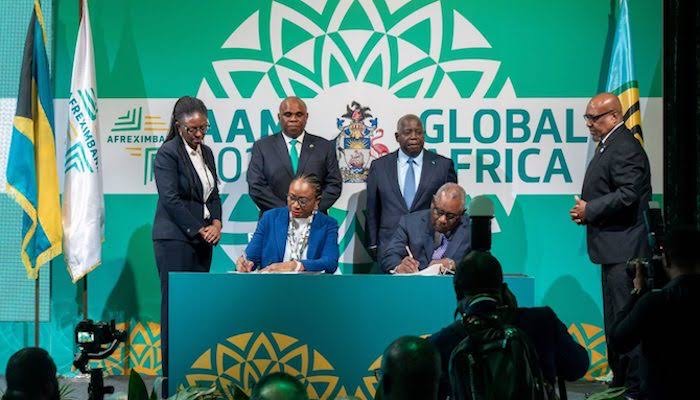
Abuja, Nigeria – In a significant boost to Nigeria’s industrialization drive, the African Export-Import Bank (Afreximbank) is set to commence construction of a $5 billion integrated textile industrial facility in Nigeria this July. This landmark project, announced by outgoing Afreximbank President Benedict Oramah, is a key component of the bank’s ambitious continent-wide industrialization strategy.
The immense facility, a collaborative effort between Afreximbank, Arise IIP, and Swiss textile equipment manufacturer Reiter, is expected to breathe new life into Nigeria’s struggling cotton industry. Projections indicate it could save Nigeria up to $4.7 billion annually in textile imports and generate a staggering 250,000 jobs across the value chain.
“This would be one of the very large textile facilities being developed under a $5 billion partnership… supported by the Swiss Government,” Oramah stated during his speech at the bank’s recently concluded 32nd Annual Meetings in Abuja. He emphasized that this initiative underscores Afreximbank’s deepening commitment to industrialization, which he described as the “cornerstone of Africa’s economic transformation.”
The move is also integral to the bank’s broader vision of fostering Africa’s trade resilience and self-reliance, aiming to reverse years of external dependence that, according to Oramah, have yielded limited progress.
Looking ahead, Oramah expressed confidence that Afreximbank’s total assets and guarantees, currently standing at $43.5 billion, could exceed $250 billion within the next decade. He stressed that a bank of such magnitude is crucial for Africa to “escape from the shame of poverty and underdevelopment.”
The textile facility announcement was among several pivotal interventions highlighted by Oramah in what marked his final annual address after a decade at the helm. Stepping down this weekend as Afreximbank’s third president, Oramah leaves behind a legacy of transformative growth for the institution and Africa’s economic infrastructure.
Since assuming office in 2015, Oramah has adeptly guided the Cairo-headquartered institution through various crises, including commodity price shocks, the COVID-19 pandemic, the Ukraine war, and ongoing debt challenges. Throughout these turbulent times, he consistently prioritized the bank’s long-term vision of promoting intra-African trade, regional industrialization, and strategic self-sufficiency.
Under his leadership, Afreximbank has disbursed over $155 billion in trade and development finance, with $120 billion of that amount deployed since 2020. The bank’s total assets and guarantees have experienced an astonishing eightfold increase, revenues have grown sevenfold, and net income surged from $125 million in 2015 to nearly $1 billion in 2024. Shareholders’ funds also significantly rose from $1 billion to $7.5 billion.
“We have collectively, over the past decade, built a solid financial institution that is good for Global Africa,” Oramah proudly declared to delegates, which included African heads of state, ministers, and central bankers. “I gave the job the best of my energy, intellect, courage, and determination.”
Oramah’s guiding principle of “African best practice” – prioritizing homegrown solutions over imported international models – was a prominent theme in his farewell address. He argued that Africa’s persistent poverty, limited industrial base, and fragmented markets are a consequence of uncritically adopting policies designed elsewhere.
“Our approach at Afreximbank has been to find an alternative ‘best practice’,” he explained. “It is because of the adoption of ‘African Best Practice’ that we have accomplished some impactful interventions.”
These impactful interventions include Afreximbank’s $4 billion support for the Dangote Refinery, a $2.9 billion facility for Tanzania’s Rufiji Hydropower Dam, and a $750 million loan that assisted Ghana in securing IMF support. The bank’s robust COVID-19 response also saw the establishment of a pooled procurement platform for medical supplies and a $2 billion vaccine facility that helped Africa secure 400 million doses. Amidst the Ukraine war, the bank disbursed $50 billion to mitigate the shocks from disrupted supply chains.
Oramah also highlighted the critical need to address the long-standing gap in reliable trade and investment information, stating, “For far too long, we have placed our health, our trade, and our destiny in the hands of others.”
Under his transformative leadership, Afreximbank has evolved into a formidable development powerhouse, establishing a suite of institutions that now underpin Africa’s economic resilience and integration. These include the African Medical Centre of Excellence (AMCE) in Abuja, a $300 million state-of-the-art facility for specialized medical care and research, with plans for replication across Africa. He also spearheaded the launch of Africa Trade Centres, designed to provide trade-enabling infrastructure and digital tools, and championed the Fund for Export Development in Africa (FEDA), the bank’s equity investment arm. The establishment of the AfriCaribbean Trade and Investment Forum (ACTIF) and the Africa-Caribbean Business Council (ACBC) further underscores his vision for Global Africa collaboration.
Each of these institutions embodies Oramah’s vision of building an “Africa-owned, Africa-led” architecture capable of delivering sustainable growth, health sovereignty, and industrial transformation for the continent.
“Because we realised that there was no common denominator practice that propelled the high-performing economies of the world… an institution like ours must understand the power of capital owned and controlled by Africans, in unlocking Africa’s development, and use it boldly, and with courage and expertise, to support African people,” Oramah affirmed.
Afreximbank has also been instrumental in laying the institutional groundwork for the African Continental Free Trade Area (AfCFTA), notably through the Pan-African Payment and Settlement System (PAPSS), which is now active in 16 countries and supported by a $3 billion Afreximbank clearing fund. Other key initiatives include AfPAY, a foreign currency payment platform that has processed $68 billion in transactions since 2020, and the Intra-African Trade Fair, which has generated $100 billion in deals since 2018 and is evolving into the AfCFTA marketplace. The bank also established the $10 billion AfCFTA Adjustment Fund and Africa Quality Assurance Centres, including one operational in Ogun State, Nigeria, to boost product certification and harmonize standards.
Oramah’s tenure also saw Afreximbank expand its reach into the Caribbean, with 12 CARICOM nations joining the bank and a regional office established in Barbados.
As he prepares to hand over the reins, Oramah paid tribute to his predecessors and urged continued support for Afreximbank’s vital mission. “Africa must remain your passion and priority. We must not rest until the dignity of all Africans is restored,” he implored.
“Afreximbank has become the trusted institution for mitigating the adverse impacts of economic shocks. I see the bank at no less than $250 billion in assets and guarantees in 10 years. And we must support and work towards that vision.”









Add Comment